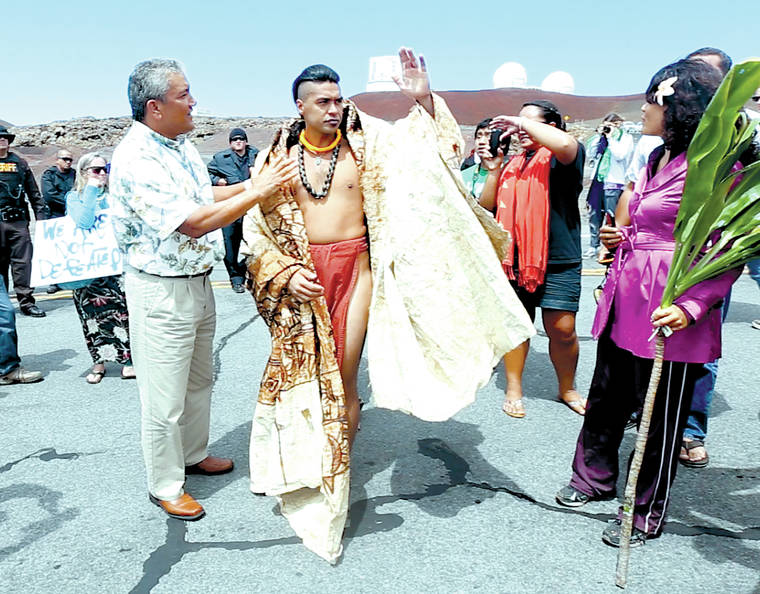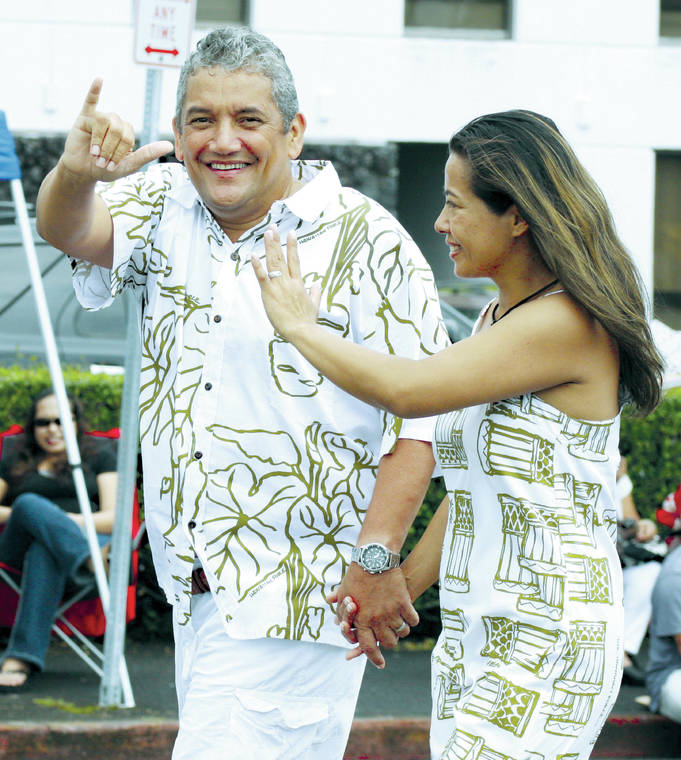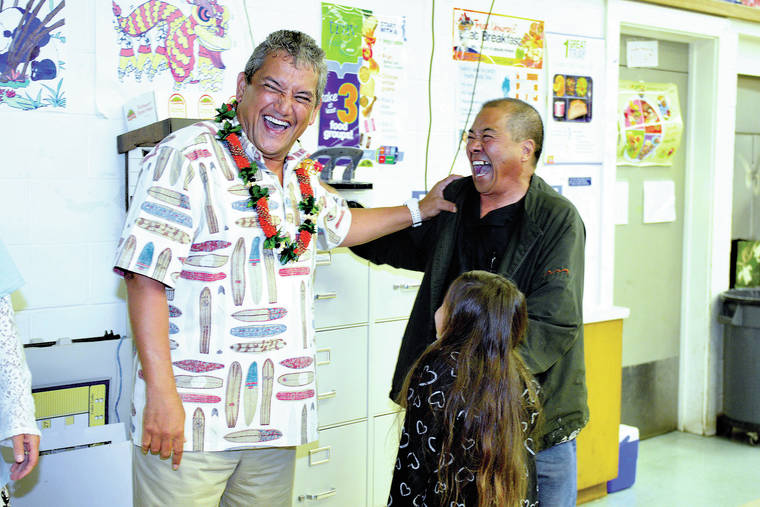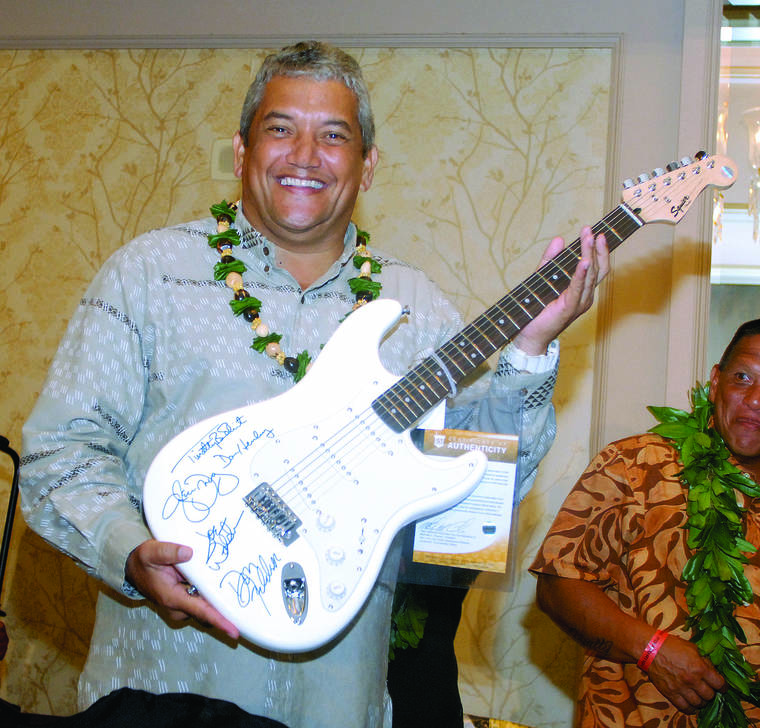Hawaii lost a rising political star and ambassador of aloha Tuesday with the death of former Big Island Mayor Billy Kenoi, who succumbed to myelofibrosis, a rare form of leukemia he had battled since 2015. He was 52.
“Billy Kenoi was the embodiment of a true Big Island boy and a pillar of our community. His time as mayor and the accomplishments made under his direction were just a small glimpse of the man he was and the aloha he had for this community,” said Mayor Mitch Roth in a statement. “Our thoughts and prayers are with his wife, Takako, and his three children today as we remember a man who brought with him tenacity, vigor, aloha and a can-do attitude that is unparalleled to most. In his honor, I ask that when faced with any challenge, big or small, that we remember his famous words, ‘If can — can; if no can — still can!’”
Kenoi often pointed to his humble beginnings growing up in Kalapana while encouraging others, especially youth, to strive to do their best.
“When I told people I was gonna be the mayor of Hawaii Island, they told me, ‘Hrrmm how do you plan on doing that.’ … When I told people I was gonna be one lawyer, they said, ‘Braddah, you need one lawyer, you not gonna be one lawyer,’” Kenoi said during a May 15, 2014, commencement address at Hawaii Pacific University.
The speech, heavy on the pidgin and frequently interrupted by cheers and applause, became a YouTube hit.
“I had a 1.8 GPA outta high school and when I told guys I was going to college, they told me, ‘Easy, Hawaiian. Maybe you bettah throttle back some of that ambition and dreams.’ I’m here for tell you guys no listen to them. ‘Cuz next thing you know, anything is possible. … Diligence, hard work, never, ever give up.”
Kenoi marveled that he was the mayor of an entire island.
“They gave me the keys to the kingdom. Like the island I live on, I’m the mayor, ” he told HPU students.
Kenoi was expected to go much farther. It was no secret he aspired to higher office, and many in the state supported that.
“Billy Kenoi was an energetic and inspirational leader who had a knack for bringing people together,” said Gov. David Ige in a statement. “His death is a huge loss for our community. Dawn and I express our deepest condolences to Billy’s family and loved ones.”
“We are a heartsick to hear Billy Kenoi has passed away. He was bigger than life and cared deeply about the people of Big Island,” said Lt. Gov. Josh Green. “I enjoyed many conversations with Billy about how to make Hawaii even more magical than it is. We’ll miss him.”
U.S. Congressman Kai Kahele called Kenoi a friend and mentor.
“Billy leaves an indelible mark on the hearts and minds of the people of Hawaii, especially those lives he generously touched on Hawaii Island,” Kahele said in a statement. “He will be greatly missed.”
During the fifth annual Native Hawaiian Convention in October 2006 in Honolulu, Kenoi was in his element, lighting up the room and giving a statewide audience an inkling of the leader he was rapidly becoming.
At turns self-depreciating and overflowing with confidence, Kenoi chided the mostly Hawaiian crowd to rise above any mistreatment in their past. Work together and encourage each other without making excuses, he said.
“When I look around, I see Hawaiian judges, Hawaiian lawyers, I see Hawaiian bankers and Hawaiian businessmen. I see Hawaiian doctors, Hawaiian teachers, Hawaiians coaching, I see a Native Hawaiian culture who work hard, who struggle, who persevere to achieve their goals to achieve their goals and objectives,” Kenoi told the crowd. “And that is what it’s about … not about if we wanna we could. If we wanna we could, and if you wanna be a success watch out ‘cuz somebody else — your own people — will pull you back down. We’re the crabs in the bucket and when one of us scrambles to the top of that bucket to get out — to escape — the rest of us grab him and pull him back in.”
Kenoi began his political career as an intern to the late U.S. Sen. Daniel Inouye, moving from there to become a legislative aide in the Hawaii state House and Senate. He served as an executive assistant to former Hawaii County Mayor Harry Kim before being elected one of the county’s youngest mayors at 39 once Kim was term-limited.
Four years into Kenoi’s tenure, Kim in 2012 launched an unsuccessful bid to take back the mayor’s office, with Kenoi winning by 2% of the vote in an election nail-biter.
In October 2014, Kenoi completed the grueling Ironman triathlon. Dubbed “Iron Mayor” by many of his supporters, the charismatic leader could often be spotted biking around Hilo, stopping to chat with folks along the way. His surfboard was often propped up against the wall in his office in the county building, just waiting for that perfect time to get out in the waves.
Several staff members saw this period as Kenoi’s best as mayor. He’d quit drinking in order to prepare for the race, he seemed happier and was easier to get along with.
“When he was doing Ironman, he was an entirely different person. We loved him,” a former staffer said in a 2018 interview. “Unfortunately, it didn’t last.”
His focus on fitness continued with a February 2015 collaboration with Hawaii Medical Service Association, the state’s largest health insurer, to create Blue Zones on the island to encourage healthy lifestyles.
Then, in late 2015, Kenoi found out he had myelofribrosis.
Facing an uncertain future after his cancer diagnosis, Kenoi launched himself into a flurry of park and athletic field improvements and ribbon cuttings, determined to leave a legacy for the children. More than 20 parks and playing fields were added during his tenure. Change orders piled up and millions more was spent as contractors made errors trying to complete work to Kenoi’s accelerated schedule.
Kenoi was known for being the life of the party, but he wasn’t all play and little work. Top staffers came and went, some claiming burnout trying to keep up with the fast pace and long hours of a mayor who tried to cram two days’ work into every workday — not to mention weekends.
He often was frustrated with what he saw as the slow pace of the employees, hiring a record number of workers on short-term contracts to augment work done by staff. One time he was so frustrated with a mistake made on construction of a gym in Pahala, he fired three Public Works Department engineers on the spot. As it turned out, he didn’t have authority to fire the union-protected workers, and eventually they all came back.
Kenoi kept his diagnosis close to the vest during that hectic last year in office that also found him defending himself against first ethics charges and then criminal charges stemming from his admitted misuse of his county purchasing card.
Kenoi paid back charges for everything from hostess bars to surfboards, to what prosecutors would later call “exorbitant amounts of alcohol.”
Kenoi admitted violating procurement codes through the misuse of his purchasing card in a settlement agreement with the county Board of Ethics. A Big Island jury on Nov. 1, 2016, cleared him of all criminal counts.
It wasn’t Kenoi’s first brush with the law.
In 1989, at the age of 20, he was arrested and charged with growing 75 marijuana plants on his parents’ property in Hawaiian Paradise Park. He pleaded no contest to the charges, was sentenced to five years probation, 100 hours of community service and a 90-day suspended jail sentence. The case was later dismissed.
Kenoi used that experience as an object lesson at a 2006 Aha Kane gathering, according to former Star-Advertiser columnist Lee Cataluna.
“I went into farming … but wasn’t taro,” Cataluna quoted Kenoi as saying. “Next thing you know … I wen’ get caught in Green Harvest. Lock up.”
During his final official grand opening as mayor, Kenoi on Dec. 6, 2016, teared up as he celebrated the renovation of Mauna Kea Recreation Area. He was still keeping his medical condition out of the public eye, but those in attendance saw an uncharacteristically emotional side of Kenoi.
Kenoi, who said he and his wife, Takako, were holding hands and reflecting on the past years during their drive up from Hilo, waxed nostalgic about his 15 years in the mayor’s office — seven as executive assistant to Kim and eight as mayor in his own right.
“What a beautiful place to call home,” Kenoi said at the time. “And what better place to fix up and open up for the people of this island. … This shouldn’t be one neglected place.”
In March 2017, his condition deteriorated, forcing him to undergo blood transfusions and then bone marrow transplants, as he became weak and lethargic.
Kenoi’s condition was more noticeable in October 2017, when he defended Sean “Peaman” Pagett before the state Board of Land and Natural Resources over Pagett’s lack of permits for biathlon events at Kailua Pier. The former mayor, still sporting a bandage on his arm, represented Pagett before the Land Board, working out a settlement agreement and later taking care of the permits so the races could continue.
“Billy Kenoi is the true spirit of aloha,” Pagett said in a Nov. 24, 2017, sports article in West Hawaii Today. “Billy went above and beyond … I mean this is a guy who just finished up having a bone marrow transplant and he had just had chemotherapy for multiple myeloma. So he came straight from California after having a bone marrow transplant to go to the hearing on Oct. 13. He was very nervous about being bald there and looking like he had cancer because no one knew. But he was there because of me.”
Kenoi, a graduate of Waiakea High School and the University of Massachusetts Amherst, received his law degree from the University of Hawaii. After graduating from the William S. Richardson School of Law at UH-Manoa in 1996, he passed the bar exam and then served as a clerk for Judge Richard K. Perkins of the 8th Division of the 1st Circuit. He worked as a deputy public defender in the Appellate, Family Court, Juvenile Criminal and Adult Family Court divisions.
He was teaching at Hawaii Community College and on the verge of opening his own law practice when the disease intensified its hold.
Kenoi announced his medical condition to his Facebook friends on March 28, 2018, saying what was supposed to be a regular checkup at the City of Hope in Duarte, Calif., showed the cancer had mutated and come “roaring back.” He began a month of an aggressive response of chemotherapy and treatments.
“I write this in the early morning hours of a hotel room with strong faith, a positive attitude and a broken heart for putting my family through this again,” Kenoi said in his Facebook post. “Thanks for always showing so much love and affection to my family. I humbly ask you continue to aloha my ohana.”
Kenoi leaves behind, in addition to his wife, sons Liam and Justin and daughter Mahina.
“His ohana is grateful for the outpouring of aloha, and thanks everyone for their support and for respecting their privacy at this time,” said family friend Ilihia Gionson in a statement. “Details on memorial services are forthcoming.”
Email Nancy Cook Lauer at ncook-lauer@westhawaiitoday.com.















